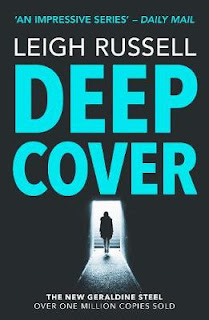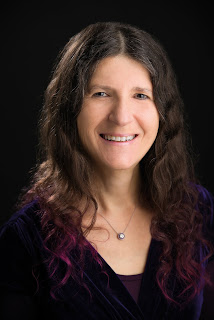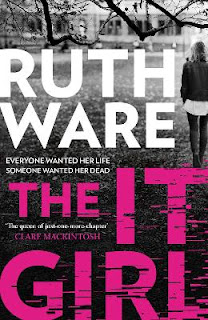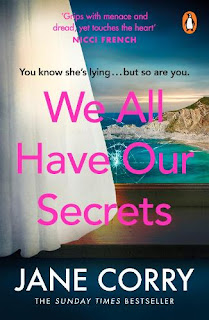Meet Leigh Russell Author Of Deep Cover
Prolific writer Leigh Russell recently released the sixteenth book in her Geraldine Steel series, Deep Cover, and we're delighted to welcome her to tell us about her long-running series, writing methods, favourite authors and fantasy undercover research (hint, it involves a sexy affair!)
For aspiring writers she also talks about the difficulty in getting traditionally published, where she gets her ideas from and shares William Faulkner's best advice.
Download the ebook of Deep Cover from Amazon or buy the paperback from Thriller Women's list at Bookshop.org. NB: if you buy books through this link we may earn a commission from bookshop.org, whose fees support independent bookshops.
TW: Leigh, congratulations on the release of Book 16 in your Geraldine Steel series! Are you at the stage now where you have a planned number of books for Geraldine, or a rough ending planned for her story?
LR: My ideas for a series ending have changed as Geraldine’s story has evolved. I’m writing the 18th book in the series at the moment, and have agreed to write 20 in total, so there is still a little way to go. I’m excited about my current idea for a grand conclusion - but being a crime writer, I can’t give away the ending of book 20 before you reach it!
TW: In Deep Cover, you expertly juggle several plot strands before bringing everything to a neat conclusion. How do you go about plotting your novels? Do you need to know the ending in advance before you start writing?
LR: I would love to plan my books in advance, but however hard I try to be organised, my characters always want to explore in different directions. Most of my ideas actually occur to me as I’m writing. Somehow the act of putting words down on the page seems to spark my imagination. So, I usually have no more than a rough idea of where I’m going, which can be terrifying as there’s usually a publisher’s deadline looming. But as writers, we have to trust ourselves and our own creativity.
TW: Tell us about your writing methods. Do you aim to get a particular number of words written per day?
LR: On average, I seem to write about 2,000 words a day, but that isn’t a deliberate choice. It just seems to work out that way. There are days when life is busy and I don’t manage to write at all, but I have never written more than 5,000 words in one day, and that length is rare for me. Writing can be exhausting. Outwardly you’re just sitting at a screen, but the process is mentally and emotionally draining.
TW: It’s a cliché of a question, but where do you draw your ideas from? Do you keep notebooks?
LR: I’ve no idea where my ideas come from! I don’t enjoy reading about true crimes, which I find upsetting rather than inspiring, and I don’t keep notebooks. I simply sit down and start to write and somehow the ideas work themselves out on the page. I may have been inspired by something I’ve seen or heard. As a writer you become a gannet, and everything you come across is potential material for a book, even if you’re not gathering material consciously.
TW: At the end of Deep Cover in the acknowledgments, you thank a doctor for their medical advice. How much research were you able to conduct into the world of police undercover work, and in turn the illegal drugs trade?
LR: While working undercover for six months with the drug squad, I enjoyed a passionate fling with a very sexy sergeant, and single handedly saved him from a vicious drug dealer... well, I do make up stories for a living! The serious answer is that I always endeavor to do as much research as is necessary for my story to be plausible. Research is a fascinating path to tread and can become so absorbing that it distracts from writing the story, so I have to be quite strict with myself. When I was researching for a historical novel, I spent two years reading about the period before starting to write the book.
TW: Did the recent lockdowns in the UK make you a more productive writer? Or did they have the opposite effect?
LR: During the recent lockdowns I made a deliberate decision to ignore the pandemic in my writing and Geraldine Steel exists in a parallel universe where covid never happens. Fiction for me is an escape from the real world, and I didn’t want to focus on the pandemic while writing. But then, almost by chance, I wrote a dystopian novel which was published in April. It’s set in the aftermath of a worldwide virus that destroys virtually all life on earth. So, my writing didn’t escape the pandemic altogether. I’m not sure that I became more productive because there’s a limit to how much I can write in a day, but I did read a lot more, which was wonderful.
TW: In your view as a Consultant Royal Literary Fellow, is it more difficult now than ever before for a writer in the UK to get published in the traditional way? And what does it take for an author in 2021 to succeed?
LR: There are many reasons why the route to traditional publication is becoming increasingly difficult, not least because so many people are writing books. With the numbers of creative writing courses available, more and more people are writing.
TW: You also run writing skills courses, advertising them via your social media platforms. Have these proved more popular as the pandemic went on? Are most of your students relatively new to creative writing?
LR: I can’t say how the pandemic had impacted on my own courses as I only started them a month ago. This project was the result of a stray idea to run a six-week course and I was overwhelmed with enquiries. I anticipated attracting about half a dozen participants. In the event, within a week nearly a hundred people expressed serious interest. Unfortunately, I wasn’t able to accommodate them all in the four courses I have run this year. I hope to run more courses in 2022, if I have time. They are really rewarding to run, and the participants have all been incredibly enthusiastic and appreciative. My students range from successfully published authors to complete novices, which is absolutely fine, because we are all equal as writers.
TW: What is the best piece of advice you can offer someone looking to embark on writing their first novel?
LR: William Faulkner gave the best advice to aspiring writers when he said, “Read, read, read. Read everything -- trash, classics, good and bad, and see how they do it. Just like a carpenter who works as an apprentice and studies the master. Read! You'll absorb it. Then write. If it's good, you'll find out. If it's not, throw it out of the window.”
Quick fire questions:
LR: That is an impossible question to answer. I hope they are all equally enjoyable to read, as they have been to write.
LR: There are too many to choose from, and this question is not as simple as it appears. Depending on my mood I might want to read an entertaining writer like LC Tyler, or someone darker such as Chris Carter, a page turner like Lee Child, a historical novel, a psychological thriller, a domestic noir, or a spy thriller. There are numerous brilliant authors, many of them writing today, and many sub genres of crime fiction to suit different moods in the reader.
LR: My ‘favourite’ book changes and it’s difficult to mention just one. But if this is for a long journey, then perhaps Ken Follett.
LR: Read or write.
LR: Gin and tonic or, for a celebration, Prosecco.
More about Deep Cover:
When a sex worker dies in suspicious circumstances in York, Detective Inspector Geraldine Steel struggles to remain focused on the murder investigation: she is distracted by her worries about her colleague and life partner, Ian Peterson, who has disappeared.***
Next week on Thriller Women our special guest is Paula Hawkins talking about her latest novel A Slow Fire Burning. Bookmark www.thrillerwomen.co.uk so you don't miss out!




Comments
Post a Comment